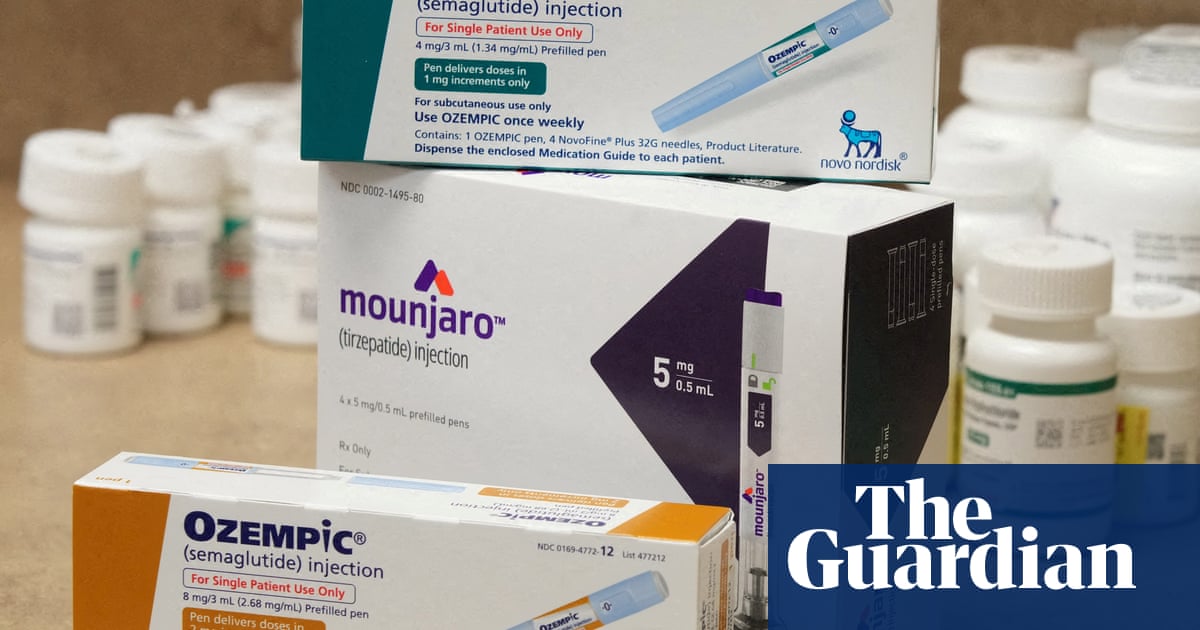Women using weight-loss drugs have been urged to use effective contraception after dozens have reported becoming pregnant while taking the medication.
The Medicines and Healthcare products Regulatory Agency (MHRA) has issued its first alert to the UK public regarding contraception and weight-loss medications after it received 40 reports relating to pregnancies while using drugs such as Ozempic, Wegovy and Mounjaro.
Ozempic and Wegovy, which both contain semaglutide, work by mimicking a hormone called GLP-1 that triggers an increase in the production of insulin, slows the rate at which food is digested in the stomach and reduces appetite.
Mounjaro, which contains the active ingredient tirzepatide, acts on a second hormone involved in appetite and blood sugar control. Although these have been referred to as “weight-loss injections”, not all are authorised for weight loss.
The MHRA said Mounjaro may reduce the effectiveness of oral contraceptives such as the pill in people who are overweight, and that women taking the medication should use barrier contraceptives such as condoms. It said it had received 26 pregnancy-related reports for Mounjaro.
Last year theGuardian reportedthat the popularity of weight-loss drugs had resulted in an unexpected baby boom. The Facebook group “I got pregnant on Ozempic” had more than 750 members at the time.
The MHRA said there had been eight reports relating to pregnancy in those taking semaglutide and nine reports for liraglutide, which is found in another weight-loss drug, Saxenda. Although it is not necessary for women in the reports to say if the pregnancy was unintentional, two of these reports said the pregnancy was such.
The watchdog also said these drugs must not be taken during pregnancy, while trying to get pregnant or while breastfeeding, as there was “not enough safety data to know whether taking the medicine could cause harm to the baby”.
It said that in some instances women should continue using contraception for up to two months between stopping the medicine and trying to get pregnant.
Dr Channa Jayasena, a consultant in reproductive endocrinology and andrology at Imperial College healthcare NHS trust, said: “GLP-1 drugs copy the natural hormones made in the gut which make you feel full. This makes them powerful treatments to help women lose weight.
“Obesity reduces fertility in women. So, women with obesity taking GLP-1 drugs are more likely to get pregnant than before they lost weight.
“In addition, we think that the absorption of oral contraceptive pills may be reduced with GLP-1 drugs which slow down emptying of the stomach, though more research is needed to confirm this.
“The guidance produced by the MHRA is sensible, since it highlights that women could accidentally get pregnant when taking GLP-1 drugs.
“We don’t know how harmful GLP-1 drugs are during pregnancy; however, we know that other forms of weight loss like weight-loss surgery can increase chances of a miscarriage. So women are advised to do all they can to prevent pregnancy while taking GLP-1 drugs.”
Dr Alison Cave, the MHRA’s chief safety officer, said: “Skinny jabs are medicines licensed to treat specific medical conditions and should not be used as aesthetic or cosmetic treatments. They are not a quick fix to lose weight and have not been assessed to be safe when used in this way.
“Our guidance offers patients a one-stop shop for our up-to-date advice on how to use these powerful medicines safely.
“This guidance should not be used as a substitute to reading the patient information leaflet or having a conversation with a healthcare professional as part of the prescribing process.”
